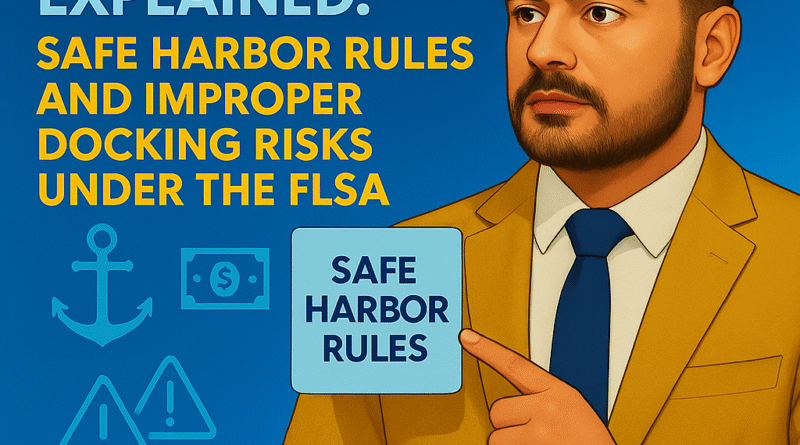Salary Basis Deductions Explained: Safe Harbor Rules and Improper Docking Risks Under the FLSA
Objective: explain how the salary basis rule works under the FLSA for exempt employees, when an employer may deduct pay without losing the exemption, what is considered improper docking, and how the safe harbor can “repair” mistakes if the employer has a good written policy.
1. Salary basis: the starting point
The Fair Labor Standards Act (FLSA) says that most white-collar exemptions (executive, administrative, professional and some computer employees) require two big elements: (1) paid on a salary basis and (2) performing exempt duties. The salary basis rule means the employee receives a predetermined amount of pay each pay period, not reduced because of variations in the quality or quantity of work.
So, if you tell an exempt manager she “earns $1,200 per week,” she must get that full $1,200 for any week in which she performs any work — except in a few, very specific situations the regulation allows. If the employer starts taking money out of this salary for reasons not allowed, the pay ceases to be “salary basis,” and the employee can become nonexempt and eligible for overtime.
That’s why improper docking is so serious.
2. What deductions are allowed?
The regulations (29 C.F.R. § 541.602 and § 541.603) give a closed list of permitted deductions. If the deduction is on that list — and applied correctly — the salary basis is preserved.
Permitted deductions (classic list):
- Full-day absences for personal reasons other than sickness or disability.
- Full-day absences for sickness/disability if the employer has a bona fide plan, policy or practice of providing wage replacement benefits.
- Offset for jury fees, witness fees or military pay.
- Penalties for infractions of safety rules of major significance.
- Unpaid disciplinary suspensions of one or more full days for workplace conduct rule violations.
- First and last week of employment, when the employee does not work the full week.
- Weeks in which no work is performed.
Notice two patterns: (1) most of the time, the deduction must be for full days and (2) the reason must match the regulation. Deductions for partial-day personal absences are almost never allowed for exempt employees (except for FMLA leave).
3. What is “improper docking”?
Improper docking happens when the employer reduces the exempt employee’s salary for a reason that the FLSA does not permit. Typical examples:
- Deducting 2 hours because the employee arrived late.
- Deducting half a day because there was no work to do.
- Deducting pay because business was slow.
- Deducting for minor safety or policy violations that are not “safety rules of major significance.”
- Deducting for poor performance or low productivity within the week.
These deductions tell the Department of Labor: “this person is actually being paid like an hourly employee,” which can destroy the exemption.
| Situation | Allowed? | Why |
|---|---|---|
| Full day off for personal reasons (not sick) | Yes | Regulation permits full-day personal absence deduction. |
| Half day off to go to doctor | No (salary) | Partial-day docking is generally improper. |
| Unpaid 2-day suspension for harassment | Yes | Unpaid disciplinary suspensions of one or more full days are allowed for serious conduct rules. |
| Deductions because of lack of work on Friday | No | Employer must pay full week if any work is performed. |
4. Why improper deductions are dangerous
Improper docking can have a retroactive effect. If the employer’s actual practice shows that it “does not intend to pay on a salary basis,” the DOL or a court may say that the employee was never exempt at all. That can lead to liability for:
- Unpaid overtime (time-and-a-half for hours over 40);
- Liquidated damages (often equal to the unpaid wages);
- Attorneys’ fees and costs.
Worse: if several employees were paid the same way, all of them might lose the exemption for the period of the improper practice.
Further reading:
5. Safe harbor: how employers can fix mistakes
The FLSA regulations recognize that honest mistakes can happen. That is why 29 C.F.R. § 541.603(d) created the safe harbor. The safe harbor lets employers preserve the exemption even after an improper deduction, if the employer:
- Has a clearly communicated policy that prohibits improper pay deductions; and
- Provides a complaint mechanism so employees can report deductions they believe are wrong; and
- Reimburses employees for improper deductions quickly; and
- Commits to future compliance (promises not to keep making the same deduction).
If all that is present, the DOL says the employer’s improper deduction is just an isolated or inadvertent deduction — not a real sign that the employee was not salaried.
Safe harbor formula: written policy + reporting channel + prompt payback + stop the practice = exemption stays intact.
6. When the safe harbor does not work
There is a limit. If the employer keeps making the same kind of improper deductions — for example, docking half days whenever business is slow — that is called a “pattern or practice” of improper pay deductions. In that case, the safe harbor cannot rescue the exemption for the affected employees during the time of the practice.
Also, the safe harbor only protects employees who were covered by the policy. If a remote division never received the handbook or policy, they may not be covered.
7. Graphic logic for HR
(use as infographic)
- Was there a deduction? → Yes.
- Is the deduction on the permitted FLSA list? → Yes → OK. / No → Go to step 3.
- Do we have a written, communicated policy prohibiting improper deductions with a complaint channel? → Yes → reimburse → document → exemption preserved (isolated).
- Are we doing this kind of deduction often? → Yes → pattern/practice → exemption may be lost for group.
8. Quick Guide (English)
- 1. Salary basis = same amount every week, no cuts for quality/quantity.
- 2. Only deduct for the items listed in 29 C.F.R. § 541.602.
- 3. Avoid partial-day deductions for exempt employees (exception: FMLA).
- 4. Keep a written “no improper deductions” policy in the handbook.
- 5. Give employees a way to complain and pay them back fast.
- 6. If deductions become a habit → you may lose the exemption for everyone in that unit.
9. FAQ (English)
1) Can we dock an exempt employee for coming in 2 hours late?
Generally, no. Partial-day docking threatens the salary basis. If you need to control time, consider using paid time off banks, not salary deductions.
2) What if the employee has no PTO left?
Even if PTO is exhausted, the employer should be careful. Deducting from salary for a partial-day personal absence is usually improper. Some employers allow the balance to go negative or treat it as leave without pay only for full days.
3) Does FMLA change the rule?
Yes. For FMLA-qualifying leave, an employer may make deductions for absences of less than a full day without destroying the exemption, but only for the FMLA period.
4) If we reimbursed the employee, is the problem solved?
It can be — if you have and follow a safe harbor policy, and the deduction was an isolated incident. Repeated or willful deductions will not be cured by reimbursement alone.
5) What if a supervisor made the deduction on their own?
It still counts. Train supervisors not to take money out of salary on their own. Then use safe harbor to fix it and document corrective action.
6) Can states be stricter?
Yes. Some states have wage deduction laws and wage payment timing rules that are stricter than federal law. Employers must follow the rule that is more protective of the employee.
10. Technical / legal base (English)
- FLSA: 29 U.S.C. § 201 et seq.
- Salary basis: 29 C.F.R. § 541.602.
- Effect of improper deductions; safe harbor: 29 C.F.R. § 541.603.
- DOL Wage and Hour Division: Fact Sheets on white-collar exemptions and salary basis.
- Case law: federal cases upholding loss of exemption for repeated improper deductions.
11. Conclusion
The salary basis rule is the backbone of the FLSA white-collar exemptions. Most lawsuits in this area do not arise because the employee’s duties were obviously nonexempt, but because payroll or supervisors made small, repeated deductions that turned into a pattern. The smart path is to write, publish and enforce a no-improper-deductions policy, train managers, and use the safe harbor whenever a mistake happens. That way the employer protects the exemption and avoids paying years of overtime retroactively.
Legal notice: This text is informational only and does not replace guidance from a licensed U.S. employment/labor attorney or your local payroll adviser.

